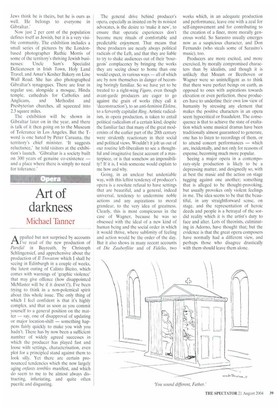Art of darkness
Michael Tanner
Appalled but not surprised by accounts I've read of the new production of Pars ifal in Bayreuth, by Christoph Schlingensief, and apprehensive about the production of II Trova tore which I shall be seeing in Edinburgh in a couple of weeks, the latest outing of Calixto Bieito, which comes with warnings of 'graphic violence' that may give offence (how disappointed McMaster will be if it doesn't!), I've been trying to think in a non-polemical spirit about this whole issue. The only thing of which I feel confident is that it's highly complex, and that as soon as you commit yourself to a general position on the matter — say, one of disapproval of updating or major location-shift — something happens fairly quickly to make you wish you hadn't. There has by now been a sufficient number of widely agreed successes in which the producer has played fast and loose with settings, characterisation, even plot for a principled stand against them to look silly. Yet there are certain pronounced tendencies which the now largely aging enfants terribles manifest, and which do seem to me to be almost always distracting, infuriating, and quite often puerile and disgusting. The general drive behind producer's opera, especially as insisted on by its noisiest advocates, is the desire to 'make it new', to ensure that operatic experiences don't become mere rituals of comfortable and predictable enjoyment. That means that these producers are nearly always political radicals of the Left, and that they are liable to try to shake audiences out of their 'bourgeois' complacency by bringing the works they are seeing closer to home than one would expect, in various ways — all of which are by now themselves in danger of becoming boringly familiar. So we have yet to be treated to a right-wing Figaro, even though avant-garde producers are eager to go against the grain of works (they call it 'deconstruction.), to an anti-feminist Elektra, to a fervently capitalist Ring. Artistic radicalism, in opera production, is taken to entail political radicalism of a certain kind, despite the familiar fact that many of the great modernists of the earlier part of the 20th century were stridently reactionary in their social and political views. Wouldn't it jolt us out of our routine left-liberalism to see a thoughtful and imaginative fascist account of a masterpiece, or is that somehow an impossibility? If it is, I wish someone would explain to me how and why.
Going, in an unclear but undeniable way, with this leftist tendency of producer's opera is a resolute refusal to have settings that are beautiful, and a general, indeed universal, tendency to undermine noble actions and any aspirations to moral grandeur, to the very idea of greatness. Clearly, this is most conspicuous in the case of Wagner, because he was so obsessed with the ideal of a new kind of human being and the social order in which it would thrive, where sublimity of feeling and action would be the order of the day. But it also shows in many recent accounts of Die Zauberflate and of Fidelio, two works which, in an adequate production and performance, leave one with a zeal for self-improvement and for contributing to the creation of a finer, more morally generous world. So Sarastro usually emerges now as a suspicious character, and Don Fernando (who steals some of Sarastro's music), too.
Producers are more excited, and more exercised, by morally compromised characters than by idealists, and though it is unlikely that Mozart or Beethoven or Wagner were so unintelligent as to think that there were perfect beings on earth, as opposed to ones with aspirations towards elevation or even perfection, these producers have to underline their own low view of humanity by stressing any element that makes the positive characters in an opera seem hypocritical or fraudulent. The consequence is that to achieve the state of exaltation which some musical dramas have been traditionally almost guaranteed to generate, one has to listen to recordings of them, or to attend concert performances — which are, incidentally, and not only for reasons of expense, becoming much more popular.
Seeing a major opera in a contemporary-style production is likely to be a depressing matter, and designedly so, with at best the music and the action on stage tugging against one another; something that is alleged to be thought-provoking, but usually provokes only violent feelings in me, The idea seems to be that the beautiful, in any straightforward sense, on stage, and the representation of heroic deeds and people is a betrayal of the sordid reality which it is the artist's duty to face and alter. Lots of theorists, culminating in Adorn°, have thought that; but the evidence is that the great opera composers have normally had a different view, and perhaps those who disagree drastically with them should leave them alone.


























































 Previous page
Previous page